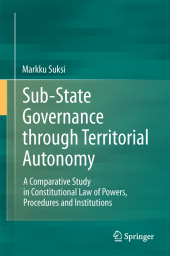 Neuerscheinungen 2014Stand: 2020-02-01 |
Schnellsuche
ISBN/Stichwort/Autor
|
Herderstraße 10
10625 Berlin
Tel.: 030 315 714 16
Fax 030 315 714 14
info@buchspektrum.de |

Markku Suksi
Sub-State Governance through Territorial Autonomy
A Comparative Study in Constitutional Law of Powers, Procedures and Institutions
2011. 2014. xxxiii, 685 S. 15 Tabellen. 235 mm
Verlag/Jahr: SPRINGER, BERLIN; SPRINGER BERLIN HEIDELBERG 2014
ISBN: 3-642-44342-7 (3642443427)
Neue ISBN: 978-3-642-44342-8 (9783642443428)
Preis und Lieferzeit: Bitte klicken
This study focuses on territorial autonomy, often used in conflict-resolution and minority situations. The text provides a comparative analysis of the constitutional law that regulates the position of six current territorial autonomies.
This study focuses on territorial autonomy, which is often used in different conflict-resolution and minority situations. Four typical elements are identified on the basis of the historical example of the Memel Territory and the so-called Memel case of the PCIJ; distribution of powers, participation through elections and referendums, executive power of territorial autonomy, and international relations. These elements are used for a comparative analysis of the constitutional law that regulates the position of six currently existing special jurisdictions, the land Islands in Finalnd, Scotland in the United Kingdom, Puerto Rico in the United States of America, Hong Kong in China, Aceh in Indonesia and Zanzibar in Tanzania. The current sub-state entities examined can be arranged in relation to Memel in a manner that indicates that Hong Kong and the land conform to the typical territorial autonomy, while Puerto Rico and Aceh should probably not be understood as territorial autonomies proper. At the same time, the territorial autonomies can be distinguished from federally organized sub-state entities.
Introduction.- The Autonomy of Memel.- The Relationship between Federalism and Autonomy.- Conflict Resolution in a Self-Determination Context as a General Frame for Sub-State Arrangements.- The Distribution of Powers.- Participation in Decision-Making.- The Executive Power.- International Relations.- Concluding Remarks.


